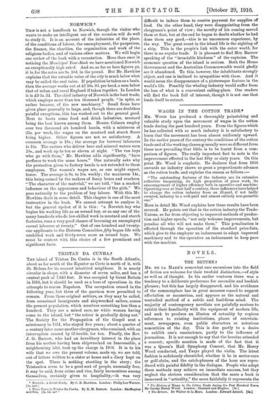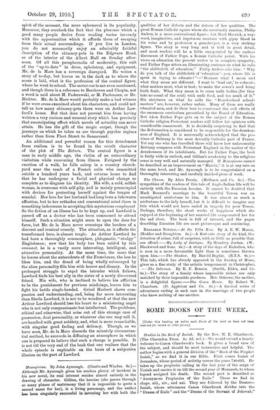NOVELS.
THE RETUEN4
Mn. DE LA MARE'S somewhat rare excursions into the field of fiction are welcome for their twofold distinction,—of style as well as of thought. In his earlier ventures there was a tendency to a deliberate preference for recondite and bookish phrases ; but this has largely disappeared, and his avoidance of the commonplace has in great measure ceased to suggest affectation or mannerism, and appears as the natural and unstudied method of a subtle and fastidious mind. The majority of contemporary novelists are painfully anxious to- exhibit their familiarity with the equipment of modern life, and seek to produce an illusion of actuality by copious references to existing institutions, places of entertain- ment, newspapers, even public characters or notorious nonentities of the day. This is due partly to a desire to exhibit one's omniscience, partly to the influence of journalism. It is not enough to say that the heroine attended a concert; specific mention is made of the fact that it was a Queen's Hall Symphony Concert, that Mr. Henry Wood conducted, and Ysaye played the violin. The latest fashion is sedulously chronicled, whether it be in motor-cars or golf-clubs, and the catch-phrases of the hour are repro- duced with painful fidelity in the dialogue. People who adopt these methods may achieve an immediate success, but they neglect the obvious consideration that the more a book is immersed in "actuality," the more faithfully it represents the * The History of Wages in the Cotton Trade during the Past Hundred Years. By George Henry Wood. London: Sherratt and Hughes. Ps.] I The Return. B Walter de In Hare. London : Edward Arnoid. [Gs.]
spirit of the moment, the more ephemeral is its popularity. Moreover, they overlook the fact that the pleasure which a good many people derive from reading varies inversely with the opportunities which it affords them of escaping from their actual surroundings. If you live in London, you do not necessarily enjoy an admirably faithful description of the chimney-pots in the Edgware Road, or of the interior of the Albert Hall on Sunday after- noon. Of all this paraphernalia of modernity, this cult of the " up-to-date " in dress, upholstery, and equipment, Mr. de la Mare has a sovereign disregard. He writes a story of to-day, but leaves us in the dark as to where the scene is laid, .what is the profession of the central figure, where he went to school. The motor-car is not even mentioned, and though there is a reference to Beethoven and Chopin, not a word is said about M. Paderewski, or M. Pachmann, or Dr. Richter. Mr. de la Mare would probably make a bad witness if he were cross-examined about his characters, and could not tell us how many chimney-pots there were on Arthur Law- ford's house. But that does not prevent him from having written a very curious and unusual story which has precisely that emancipating effect which novels of actuality can never attain. He has the gift of the magic carpet, though the journeys on which he takes us are through psychic regions rather than from Fleet Street to Samarcand.
An additional and powerful reason for this detachment from realism is to be found in the occult character of the plot of The Betas-n. The central figure is a man in early middle age, the victim of an extraordinary visitation while recovering from illness. Fatigued by the exertion of a walk, he falls asleep in a country church- yard near the tomb of a French exile who committed suicide a hundred years back, and returns home to find that he has undergone a facial and physical change so complete as to disguise his identity. His wife, a cold, selfish woman, is overcome with self-pity, and is mainly preoccupied with devices for protecting herself against the tongue of scandal. Her love for her husband had long been a lukewarm affection, but to her orthodox and conventional mind there is something indecorous in accepting this mysterious remplacant So the fiction of an illness has to be kept up, and Lawford is passed off as a doctor who has been summoned to attend himself. Such a situation might seem to open the door for farce, but Mr. de la Mare never oversteps the borders of a discreet and ironical comedy. The situation, as it affects the transformed hero, is almost- tragic. As Arthur Lawford he had been a thoroughly commonplace, phlegmatic, "stodgy" Englishman; now that his body has been raided by this revenant, he is a vastly more interesting, intelligent, and attractive personality. At the same time, the more that he learns about the antecedents of the Frenchman, the less he likes him, and the dread of being wholly submerged by the alien personality fills him with horror and dismay. In the prolonged struggle to expel the intruder which follows, Lawford finds his best ally in the sister of a newly discovered friend. His wife, who is inclined to believe his affliction to be the punishment for previous misdoings, leaves him to fight his battle single-handed. Grisel Herbert shows com- passion and understanding, and, being far more interesting than Sheila Lawford, it is not to be wondered at that the new Arthur Lawford should le his heart to a ministering angel who is not only compassionate but intellectual. The problems, ethical and otherwise, that arise out of this strange case of possession, dual personality, or whatever else one may call it, are handled with great subtlety, and, what is more remarkable, with singular good feeling and delicacy. Though, as we have seen, Mr. de la Mare discards the minutely circumstan- tial method, he succeeds in diffusing an atmosphere in which one is prepared to believe that such a change is possible. It is not till the very end of the book that one realises that the whole episode is explicable on the basis of a subjective illusion on the part of Lawford.















































 Previous page
Previous page